.De Nederlandse dichter en schrijver Philip Huff werd geboren op 28 september 1984 in Zwolle. Zie ook alle tags voor Philip Huff op dit blog.
Uit: Niemand in de stad
“Ik ben verhuisd. Heel de dag heb ik met Matt en Elisabeth op mijn oude kamer kartonnen dozen en lichtblauwe Albert Heijn-kratjes ingepakt en die omhoog gesjouwd, drie trappen op. Elisabeth liep rond in haar trainingsbroek, het lichtblonde haar opgestoken, voor het eerst een beetje op haar gemak.
Mijn moeder sopte de kozijnen en lapte de ramen. Later loeide de oude stofzuiger. Van tussen de planken van de houten vloer kwam samengeklit stof, met veel lange, witte en bruine haren erin: souvenirs van de meisjes die de afgelopen jaren bij Bart waren blijven slapen.
‘Het is maar goed dat je geen allergie hebt,’ zei mijn moeder, toen ze de volle stofzuigerzak in de vuilnisbak uitsloeg.
Elisabeth en ik tilden mijn bed en mijn bureau in delen naar boven. We zetten de nieuwe stalamp naast het bureau neer, een geschenk van Elisabeths ouders.
Nu kijk ik naar de schone, helverlichte ruimte en de ingelijste foto van Matt en mijzelf. Ik luister naar de serie van stiltes, opgedeeld door het tikken van de klok.
Mijn vorige kamer, vanwaar ik ook uitzicht op de Prinsengracht had, was de portiersloge, naast de voordeur. Ik heb er het grootste deel van mijn eerste jaar gewoond; een hok niet groter dan de meeste invaliden-wc’s, met chronische geluidsoverlast uit de keuken en van de toeristen buiten. Deze kamer is groter en stiller. Voordat Bart hier zat, was dit Jacobs kamer. De vensterbanken en kasten stonden vol gipsen en wassen modellen van het menselijk gebit. Aan de muren hingen gele plakplaatjes vol tekeningetjes van de menselijke anatomie en medische termen en steekwoorden uit zijn studieboeken. Er stond een ongeordende boekenkast die uitpuilde.
Boven mijn bed hangt nu de ingelijste prent van Joost van den Vondel uit de portiersloge. Met strenge blik, een ganzenveer en papier tussen zijn samengevouwen handen, kijkt Joost me aan. De witte boord van zijn hemd is hooggesloten. In mijn boekenkast staat zijn Gysbreght. Daarnaast een facsimile van De Vondeling, in 1851 hier vlakbij gedrukt bij G. van der Linden op de Egelantiersstraat. Gekregen van Elisabeth. Onderin staan de dikke banden van mijn studie, allemaal over historische onderwerpen, keurig op alfabet. Ik kijk naar de foto van mijn oude voetbalelft al en met een binnensmondse boer komt de daghap bij café De Prins naar boven: mosselen met worteltjes en frites.”
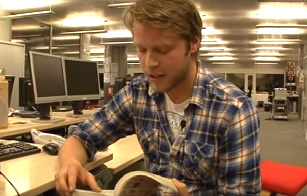
Philip Huff (Zwolle, 28 september 1984)
De Engelse schrijfster Ellis Peters werd op 28 september 1913 als Edith Pargeter geboren in Horsehay. Zie ook ook mijn blog van 28 september 2010 en eveneens alle tags voor Ellis Peters op dit blog.
Uit: The Potter’s Field
“Father, I believe he thought it only fair. My home is here, but he did not say: Go home. He sent me where I may still be within the discipline I chose, and yet feel the strong pull of place and family. Why should it be made simple for me,” said Sulien, suddenly raising his wide blue stare, unwaveringly gallant and deeply troubled, “so the answer at the end is the right one? But I cannot come to any decision, because the very act of looking back makes me ashamed.” “There is no need,” said Radulfus. “You are not the first, and will not be the last, to look back, nor the first nor the last to turn back, if that is what you choose. Every man has within him only one life and one nature to give to the service of God, and if there was but one way of doing that, celibate within the cloister, procreation and birth would cease, the world would be depeopled, and neither within nor without the Church would God receive worship. It behoves a man to look within himself, and turn to the best dedication possible those endowments he has from his Maker. You do no wrong in questioning what once you held to be right for you, if now it has come to seem wrong. Put away all thought of being bound. We do not want you bound. No one who is not free can give freely.” The young man fronted him earnestly in silence for some moments, eyes as limpidly light as harebells, lips very firmly set, searching rather his mentor than himself. Then he said with deliberation: “Father, I am not sure even of my own acts, but I think it was not for the right reasons that I ever asked admission to the Order. I think that is why it shames me to think of abandoning it now.” “That in itself, my son,” said Radulfus, “may be good reason why the Order should abandon you. Many have entered for the wrong reasons, and later remained for the right ones, but to remain against the grain and against the truth, out of obstinancy and pride, that would be a sin.”
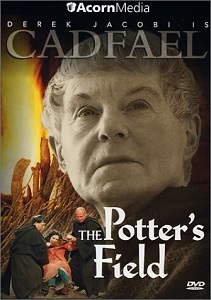
Ellis Peters (28 september 1913 – 14 oktober 1995)
Cover DVD
De Amerikaanse schrijver en uitgever Ben Greenman werd geboren op 28 september 1969 in Chicago. Zie ook mijn blog van 28 september 2010 en eveneens alle tags voor Ben Greenman op dit blog.
Uit:Dig If You Will the Picture: Funk, Sex, God and Genius in the Music of Prince
“Beginnings consume us. Or rather, we consume them. We gobble them up hungrily, certain that they will explain all that follows. We break time into segments so that it can be apprehended and, if not overtaken, at least undertaken. And, so, we start with the start of one par tic u lar segment: Prince was born on June 7, 1958. Prince was born. That’s important to remember. In a life fi lled with so many achievements— lyrics written, songs sung, instruments played, concerts performed—that they seem to require an army, or a mystical being, we should begin with a reminder that they belong to exactly one person, who arrived on the earth via normal channels rather than descending into our realm from the empyrean plane. Prince lived in music from the fi rst. His mother, Mattie Della Shaw, was a singer. His father, John Nelson, was a piano player
and composer. The two of them, African-Americans in mostly white Minneapolis, floated around the city’s jazz scene in the fifties, and for a time Mattie sang with John’s band, the Prince Rogers Trio. It’s unclear how or why John thought of his stage name, though royalty was a common theme in jazz nicknames.
Buddy Bolden was known as “King Bolden,” and there were others: King Oliver, King Watzke, King Kolax. Princes were rarer.
When he met Mattie, John Nelson had a long- term girlfriend named Vivian. Though he and Vivian never married, he had five children with her, beginning in the late forties and continuing through the late fi fties. Somewhere in there, John’s relationship with Vivian wilted, and his relationship with Mattie bloomed.
Mattie got pregnant. Their baby entered the world, and John transferred the name of his act to that baby: Prince Rogers Nelson.
The world that Prince entered was a fragile one, at least as far as American identity was concerned. Sputnik had launched the previous October, kicking off the space race with the Soviets. The United States was just emerging from the Eisenhower recession, the first major economic downturn since the Great Depression— unemployment had soared; steel and auto production had dropped. Minneapolis was at the tail end of a de cade of transformation. In 1950, the city reached the half-million mark in population — still an all- time peak— but legislation like the Housing Act of 1949 and the Federal- Aid Highway Act of 1956 were pushing population toward the near- ring suburbs and beyond. General Mills, one of the city’s industrial anchors, moved out to Golden Valley.”

Ben Greenman (Chicago, 28 september 1969)
Cover
De Nederlandse schrijver, journalist en columnist Thijs Zonneveld werd geboren op 28 september 1980 in Sassenheim. Zie ook mijn blog van 28 september 2010 en eveneens alle tags voor Thijs Zonneveld op dit blog.
Uit:Alleen op de wereld (Column)
“Hij stond in een straat in een Spaans gehucht, honderd meter na de finishlijn van de etappe waarin hij de Ronde van Spanje had verloren. Zijn helm had hij afgezet. De rode leiderstrui zat nog om zijn schouders, als de stille getuige van de droom die een uur daarvoor was uiteengespat als een glas wijn op de keukenvloer.
Om hem heen stonden ploeggenoten, verzorgers, journalisten en toeschouwers, maar niemand durfde iets tegen hem te zeggen. Hij was alleen op de wereld.
Het hoort bij topsport: winnen doe je met z’n allen, verliezen in je eentje. En hoe groter het verlies, hoe eenzamer je bent. Dumoulin was zaterdag de allereenzaamste sporter die ik in tijden heb gezien. De manier waarop hij Fabio Aru moest laten gaan, meter voor meter, in zijn eentje strijdend tegen een overmacht van huurlingen van Russische en Kazachse ploegen: het was om een potje ongenadig hard bij te janken.
Dat beeld van Dumoulin die in de verte het groepje met Aru zag verdwijnen – het was als Bambi die zijn neus in de vacht van zijn doodgeschoten moeder verstopt. Het enige dat er bij ontbrak was een zielig vioolmuziekje.
Dumoulin was de afgelopen drie weken op ontdekkingsreis door Spanje, en wij mochten mee op de bagagedrager. Hoe dichter het einde naderde, hoe hoger de inzet werd. Het werd met de dag intenser, spannender, hectischer. Het kon op twee manieren eindigen: in dolle euforie of in doffe ellende. Het werd dat laatste.
Zijn nederlaag was niet zomaar een nederlaag: het was een nederlaag zo hard en zo zwart dat hij er over twintig jaar nog buikpijn van krijgt als iemand er over begint. Dat moet je kunnen, zo verliezen.”

Thijs Zonneveld (Sassenheim, 28 september 1980)
Tom Dumoulin na het verlies in de Vuelta van 2015
De Duitse dichter, schrijver en criticus Albert Vigoleis Thelen werd geboren in Süchteln op 28 september 1903. Zie ook mijn blog van 28 september 2010 en eveneens alle tags voorAlbert Vigoleis Thelen op dit blog.
Samaritanisch
Dies hörte ich sagen:
wer gegen den Baum rennt
und hat kein Beil
ihn zu fällen
der straucht immer wieder
gegen den Baum.
Wer seine Kiefer
zahnlos bewegt
bricht auch am härtesten Elend
keinen Zahn sich mehr aus
und wer fällt unter die Räuber
und sie lassen ihn liegen
weil er nichts anhat
der tut mir leid.
Irrsinns-Strophe
Wohin mit der Wiese
auf der das Kriechtier
die Lende gelähmt hat
im Geilblick zum Uhu
der seinen Dreifuß verloren.
Niemand will sie
vor seinem Hause
noch hinter dem Hirn
der zerfurchten Verzweiflung –
Doch kurzes Holz ist
immer noch des Bauern Stolz.

Albert Vigoleis Thelen (28 september 1903 – 9 april 1989)
De Albert-Vigoleis-Thelen-Stadtbibliothek in Viersen
De Franse schrijver, regisseur en acteur Robert Thomas werd geboren op 28 september 1927 in Gap. Zie ook alle tags voor Robert Thomas op dit blog.
Uit: Huit femmes
“Madame CHANEL. — C’est un peu ma petite fille… Ah! l’arbre!
(Elle va à son gros paquet dont elle essaie de défaire la ficelle.)
LOUISE. — Vous rabâchez la même histoire depuis deux mois que je suis ici.
(Elle va débarrasser mollement la table encombrée de tasses.)
Madame CHANEL. — Quand on travaille dans une maison depuis quinze ans, on finit par croire qu’on est chez soi et que les enfants sont à vous!… Vous verres!..
LOUISE. — Si Vous croyez que je vais passer ma vie à faire la boniche!
Madame CHANEL. — C’est un métier qui ne vous plaît pas?
LOUISE. — Pas beaucoup.
Madame CHANEL. — Alors, pourquoi le faites vous?
LOUISE, interdite, puis. — Faut bien vivre…
Madame CHANEL. — Vous êtes tombée dans une bonne maison, ici…
LOUISE. — Vous trouvez?
Madame CHANEL. — Ah! de mon temps!… Je veux dire du temps où Mademoiselle Suzon était là, c’était plus gai!
LOUISE. — Evidemment! C’est bien ma chance.
Madame CHANEL. — Nous allons passer de merveilleuses fêtes de Noël!
(Elle fouille dans le bureau à la recherche de ciseaux.)
LOUISE, qui croque le sucre qui reste. — C’est ça! La veillée aux chandelles! Que voulez-vous qu’on fasse d’autre? On est à cinq kilomètres du village et avec toute la neige qui est tombée cette nuit, je ne pourrai même pas aller au bal. Quel dimanche! Et même pas la télévision!
Madame CHANEL. — La télévision? Bah! vous ne perdez rien, ça fait mal aux yeux!… (Louise hausse les épaules.) C’est le déjeuner de Monsieur que vous avez monté?
LOUISE. — Non, c’est celui de la petite.”
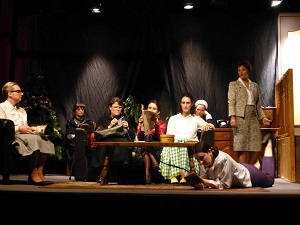
Robert Thomas (28 september 1927 – 3 januari 1989)
Scene uit een opvoering in Champigné, 2014
De Franse schrijver, historicus en archeoloog Prosper Mérimée werd geboren in Parijs op 28 september 1803. Zie ook mijn blog van 28 september 2010 en eveneens alle tags voor Prosper Mérimée op dit blog.
Uit: Carmen (Vertaald door Lady Mary Loyd)
“At the first blush, I confess, the blunderbuss, and the savage looks of the man who bore it, somewhat took me aback. But I had heard so much about robbers, that, never seeing any, I had ceased to believe in their existence. And further, I had seen so many honest farmers arm themselves to the teeth before they went out to market, that the sight of firearms gave me no warrant for doubting the character of any stranger. “And then,” quoth I to myself, “what could he do with my shirts and my Elzevir edition of Caesar’s Commentaries?” So I bestowed a friendly nod on the man with the blunderbuss, and inquired, with a smile, whether I had disturbed his nap. Without any answer, he looked me over from head to foot. Then, as if the scrutiny had satisfied him, he looked as closely at my guide, who was just coming up. I saw the guide turn pale, and pull up with an air of evident alarm. “An unlucky meeting!” thought I to myself. But prudence instantly counselled me not to let any symptom of anxiety escape me. So I dismounted. I told the guide to take off the horses’ bridles, and kneeling down beside the spring, I laved my head and hands and then drank a long draught, lying flat on my belly, like Gideon’s soldiers.
Meanwhile, I watched the stranger, and my own guide. This last seemed to come forward unwillingly. But the other did not appear to have any evil designs upon us. For he had turned his horse loose, and the blunderbuss, which he had been holding horizontally, was now dropped earthward.
Not thinking it necessary to take offence at the scant attention paid me, I stretched myself full length upon the grass, and calmly asked the owner of the blunderbuss whether he had a light about him. At the same time I pulled out my cigar-case. The stranger, still without opening his lips, took out his flint, and lost no time in getting me a light. He was evidently growing tamer, for he sat down opposite to me, though he still grasped his weapon. When I had lighted my cigar, I chose out the best I had left, and asked him whether he smoked.”
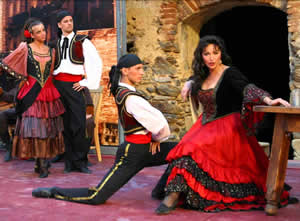
Prosper Mérimée (28 september 1803 – 23 september 1870)
Scene uit een – opgenomen – opvoering in Parijs, 1964
De Britse criticus en dichter Francis Turner Palgrave werd geboren op 28 september 1824 in Great Yarmouth. Zie ook mijn blog van 28 september 2010 en eveneens alle tags voorFrancis Turner Palgrave op dit blog.
Sidney At Zutphen
3
–Sudden, the mist gathers up like a curtain, the theatre clear;
Stage of unequal conflict, and triumph purchased too dear!
Half our boot treasures of gallanthood there, with axe and with glaive,
One against ten,–what of that?–We are ready for glory or grave!
There, Spain and her thousands nearing, with lightning-tongued weapons of
war;–
Ebro’s swarthy sons, and the bands from Epirus afar;
Crescia, Gonzaga, del Vasto,–world-famous names of affright,
Veterans of iron and blood, insatiate engines of fight:–
But ours were Norris and Essex and Stanley and Willoughby grim,
And the waning Dudley star, and the star that will never be dim,
Star of Philip the peerless,–and now at height of his noon,
Astrophel!–not for thyself but for England extinguish’d too soon!
4
Red walls of Zutphen behind; before them, Spain in her might:–
O! ’tis not war, but a game of heroic boyish delight!
For on, like a bolt-head of steel, go the fifty, dividing their way,
Through and over the brown mail-shirts,–Farnese’s choicest array;
Over and through, and the curtel-axe flashes, the plumes in their pride
Sink like the larch to the hewer, a death-mown avenue wide:
While the foe in his stubbornness flanks them and bars them, with
merciless aim
Shooting from musket and saker a scornful death-tongue of flame.
As in an autumn afar, the Six Hundred in Chersonese hew’d
Their road through a host, for their England and honour’s sake wasting
their blood,
Foolishness wiser than wisdom!–So these, since Azincourt morn,
First showing the world the calm open-eyed rashness of Englishmen born!
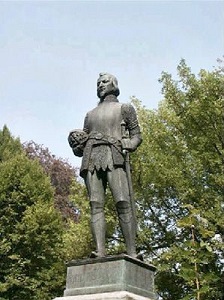
Francis Turner Palgrave (28 september 1824 – 24 oktober 1897)
Standbeeld van Sir Philip Sidney in Zutphen door Gustaaf van Kalken
De Duitse dichter Rudolf Baumbach werd op 28 september 1840 geboren in Kranichfeld/Ilm. Baumbach groeide op in Meiningen. Zie ook mijn blog van 28 september 2010 en eveneens alle tags voor Rudolf Baumbach op dit blog.
In alten Zeiten
Meine alte, gute Muhme Lore wusste zu berichten
Mehr als tausend Sagen, Märchen, Schwanke, Mord- und Spukgeschichten,
Doch am Schlüsse sprach sie sorglich: Kleiner, schreib’ dir’s hinter’s Ohr,
Also war’s in alten Zeiten ; heute kommt das nicht mehr vor.
Droben in dem Burggemäuer, sprach im Flüsterton die Muhme,
Wächst zur Zeit der Sonnenwende eine gelbe Schlüsselblume.
Wer sie pflückt, der ist geborgen, denn dann rückt ein Schatz empor. —
Also war’s in alten Zeiten; heute kommt das nicht mehr vor.
Hat’ einmal ein armer Schäfer eine Dirne sich erkoren,
Und drei Monden vor der Hochzeit ging sein Augenlicht verloren.
Doch sie ließ nicht von dem Blinden, dem sie Lieb’ und Treue schwor. —
Also war’s in alten Zeiten; heute kommt das nicht mehr vor.
Träumend lag sie einst im Grase in dem Schlosshof auf dem Berge;
Sieh, da trat zu ihr ein kleines, silberbärtiges Gezwerge,
Und das Zwerglein neigte flüsternd seinen Mund zu ihrem Ohr. —
Also war’s in alten Zeiten; heute kommt das nicht mehr vor.
Sieh die Schlüsselblume, sprach es. Willst du Geld und Gut erlangen.
Grab’ sie aus; an ihrer Wurzel wird ein rost’ger Schlüssel hangen;
Und mit Blum’ und Schlüssel findest du der Zauberhöhle Thor. —
Also war’s in alten Zeiten; heute kommt das nicht mehr vor.
Wird die Blume abgebrochen, sinkt der Schlüssel tausend Klafter,
Doch der Schlüsselblume Stengel, ein noch größer Wunder schafft er.
Sehend macht er einen jeden, der sein Augenlicht verlor. —
Also war’s in alten Zeiten; heute kommt das nicht mehr vor.
Grub die Dirne nach dem Schlüssel? Nein, des Schäfers Augenlider
Strich sie mit der Wunderblume, und das Augenlicht kam wieder.
Tausend Klafter sank der Schlüssel zu der Zauberhöhle Thor. —
Also war’s in alten Zeiten; heute kommt das nicht mehr vor.
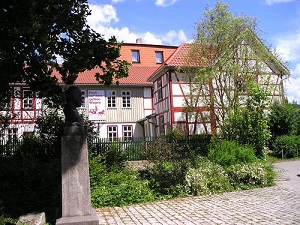
Rudolf Baumbach (28 september 1840 – 21 september 1905)
Het literatuurmuseum Baumbachhaus in Meiningen
Zie voor nog meer schrijvers van de 28e september ook mijn blog van 28 september 2014 deel 1 en eveneens deel 2.
